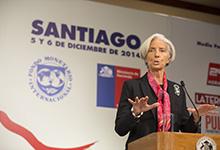
Typical street scene in Santa Ana, El Salvador. (Photo: iStock)
IMF Survey : Lagarde Calls for “Quality Growth” in Latin America
December 5, 2014
- Lagarde visits Peru and Chile to meet with political leaders, engage with region
- Latin America should focus on policies to promote “quality growth”—more balanced, inclusive, sustainable
- Countries can work better together to lift potential growth of entire region
Despite recent challenges facing Latin America, the immense potential of this diverse region is evident and will drive further progress in years to come, IMF Managing Director Christine Lagarde said at a regional conference in Chile.

Lagarde: “This is an exciting time for Latin America, which has been stretching and renewing itself economically, politically, and socially in recent years” (IMF photo)
Santiago Conference
“This is an exciting time for Latin America, which has been stretching and renewing itself economically, politically, and socially in recent years,” Lagarde stated December 5 in Santiago, Chile.
She made her remarks at the start of a two-day, high-level conference in Santiago, where policymakers and stakeholders from Latin America and the Caribbean will discuss possible remedies to support growth and financial stability in the entire region.
Lagarde, noting the recent shift in economic conditions that could worsen underlying vulnerabilities in the region, said that the conference presents a timely opportunity to discuss the recent challenges facing Latin America. “At this critical moment, it is more important than ever to foster growth that is inclusive, balanced, and sustainable,” she added.
Her visit to Chile was preceded by a visit to Peru, where she met with government officials to discuss economic developments and also to follow-up on the preparations for the next IMF–World Bank Annual Meetings, which will be held in Lima in October 2015.
Bumpy road ahead
During the past two decades, Lagarde stated that most countries in Latin America scored a “policy hat-trick” in the form of low inflation, fiscal discipline, and financial stability. She observed that these economies thrived because of their sound policy frameworks, rising commodity prices, and favorable global financial conditions.
So while other regions were struggling, Latin America weathered the 2008 global financial crisis with “quiet confidence” and made huge progress in reducing poverty and inequality. “Average real incomes have risen by more than 25 percent since 2000 and extreme poverty has been cut in half,” Lagarde said.
Despite these impressive economic and social achievements, Lagarde warned that the road ahead looks increasingly bumpy as global economic and financial conditions shift. Commodity prices, which lifted the region for more than a decade, are falling, and the era of easy dollar financing will end before long.
Lagarde also mentioned that some countries in Latin America are facing underlying vulnerabilities and others are pushing up against capacity constraints.
“This underscores the need for structural reforms in areas such as education, social safety nets, financial inclusion, and infrastructure. These reforms would raise productivity and allow the region to diversify away from primary sectors that have lower value added,” Lagarde noted.
Growing middle class
“After decades of stagnation, Latin America’s middle class has been growing in size and confidence, expanding by about 50 percent since 2003,” Lagarde said. Much of this can be attributed to a reduction in labor income inequality, including rising minimum wages, and also to targeted social assistance, she added.
But despite this progress, social indicators remain weaker, and inequality much higher, than in comparable regions. This is relevant, Lagarde explained, because the rising expectations of Latin America’s middle class are bumping up against shortcomings in the provision of public services.
Lagarde therefore encouraged governments in the region to keep working hard to improve public services, such as increasing the quality and reach of public education, broadening the system of social protection, and expanding the public revenue base. “All this—and more—is needed to create a more inclusive and stronger society,” Lagarde pointed out.
Working together
Lagarde mentioned several areas where Latin America could work together more to lift the potential growth of the entire region. Given the current challenges, Latin America should leverage its strength in numbers and deepen integration, Lagarde said.
Lagarde said that many countries still need to significantly improve their infrastructure networks. More investment and greater regional collaboration in energy, transportation, logistics and information technology would help raise potential growth.
Regional integration should also be rejuvenated. Lagarde mentioned the proliferation of trade groupings has created a “spaghetti bowl” of regimes and preferences whose aggregate benefits are unclear. “Policymakers should reassess the current approach to trade and create ways to integrate the region into global value chains,” Lagarde stated.
Beyond trade, there are a host of issues that could benefit from a greater willingness to reach across borders and learn from each other.
Among these, in Lagarde’s view, is violent crime, which is affecting the entire region. In addition to the human cost, crime also hurts investment and economic development, and corrodes democratic institutions. Efforts to strengthen the regional agenda should include topics such as labor, competition, security, and the environment.
These new forms of integration would support Latin America’s growth by increasing efficiencies in the provision of regional public goods and services, and help address region-wide social challenges, Lagarde concluded.


